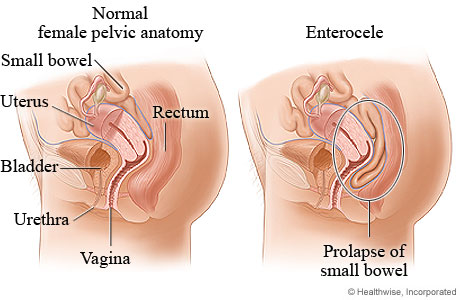Jump to
Small bowel prolapse (enterocele)

A small bowel prolapse (enterocele) occurs when the tissues and muscles that hold the small bowel in place get weak or damaged. This can cause the small bowel to move from its normal position and press against the wall of the vagina.
©2011-2026 Healthwise, Incorporated
The content above contains general health information provided by Healthwise, Incorporated, and reviewed by its medical experts. This content should not replace the advice of your healthcare provider. Not all treatments or services described are offered as services by us. For recommended treatments, please consult your healthcare provider.
